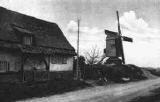French Flanders - more
Léon Dehon and French Flanders
"I praise Providence for transplanting me into this country, strong of faith and with virile, christian customs! I needed this soil to let grow my vocation." (NHV I/28r)
Léon Dehon spends the years 1855 to 1859 primarily in Hazebrouck, i.e. in French Flanders. Although he admits not to know this country in depth, it is nevertheless important with regard to Dehon's development to take a look at the atmosphere that Léon‚ inhaled' through classmates and teachers, as well as through holidays and trips through French Flanders.
This atmosphere was above all - catholic: "If there is any generally accepted truth, one truth is certainly that people from the North [of France] are religious by nature" - with this record Pierre Pierrard introduces a chapter in his book "Vie quotidienne dans le Nord".
With this in mind, the observations of Dehon are not too far from the historical reality:
"I didn't become acquainted thoroughly with the customs of French Flanders where I lived for years. However I retained precious memories of this country. The population was frankly christian. The families had many children, the customs were healthy, the practice of faith almost being universal. The parish was vital, the church was decorated, the Works [les Oeuvres] were numerous. Work was honoured, the agriculture was admirably developed and prosperous. The workers in the cities weave. Despite the large number of children there was hardly any misery ... The population spoke exclusively Flemish, and so was prevented of (morally) bad literature. The clergy was abundant, active, devoted and enjoyed much respect." (NHV I/27r ss) For Dehon's development the specific model of the catholic priest in French Flanders ...., "this clergy of the North, faithful, and full of love for the souls." (NHV I/13v)
After 1830 the number of priests constantly rises in Flanders. This clergy, often coming from a rural context, "follows the romantic ideal of the good pastor who dedicates his life to the service of the weak." (Cholvy) These ultramontanists, close to the people, numerous and active, politically conservative, engaged in charitable work, even through the late 19th century not having a view for the structural misery provoked by the ‘Social Question'.
